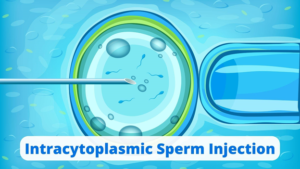Modern medical technologies in association with medications and therapies had made pregnancy possible even when any normal male-female couple is experiencing infertility. Medical technologies aim to achieve a successful pregnancy. For natural conception after natural intercourse, the sperm of the male collide with the egg of the female inside the female reproductive tract. The collision results in the fertilization of an egg. After some time, it develops into a zygote which eventually develops into the embryo. Let’s gather knowledge about the events of the series. Sperms present in the ejaculate swim up to reach the eggs released from the ovaries. The head of the sperm gets attached to the outer layer of the egg and slightly penetrates it. After penetration, the head gets inserted into the cytoplasm of the egg cell where fertilization takes place. Sometimes, due to several reasons, fertilization does not happen. These reasons may be; less motility of sperm or a thick outer layer of egg therefore sperm could not penetrate it. To overcome this problem, ICSI (Intra cytoplasmic sperm injection) is performed to directly fertilize the egg. In this process, a single sperm is directly injected into the cytoplasm of the egg to achieve undoubtful fertilization.
What is ICSI?
The cytoplasm is a gel-like substance present inside any cell, its main constituents are water, salt, and chemical and biological molecules. Intracytoplasmic sperm injection is a male infertility treatment. It is sometimes performed in association with IVF (In vitro fertilization). The semen sample of the male is clarified in the lab to obtain the pure concentration of sperm. In the laboratory, one sperm cell is infused within the cytoplasm of the egg and it is incubated for fertilization. The fertilized egg is transferred to the uterus of the female partner.
Relation between ICSI and IVF:
ICSI is a category of IVF which slightly vary from conventional IVF procedure. In traditional IVF, in a Petri dish, multiple sperms are placed around an egg, the conception possibility is left up to chance. If any of the sperm does not penetrate the egg’s outer shell, failed fertilization is declared. ICSI is different as sperm is directly injected into the cytoplasm with the help of a micropipette (tiny needle) eventually fertilized egg (embryo) is implanted in the uterus after 2 to 5 days of fertilization. If the embryo gets attached to the womb’s lining successful pregnancy is proclaimed.
Prospectus of ICSI:
Though ICSI successfully fertilizes 60% to 80% of eggs some problems may occur during this procedure, such as; retrieved eggs being damaged, fertilization did not occur even after direct injection, fertilization taking place but the embryo stopped developing or the embryo failing to get attached with uterine lining hence no pregnancy achieved.
Who would require ICSI?
ICSI is most supportive for males dealing with infertility. Doctors recommend this procedure if a male shows the following characteristics:
- If the male produces a poor quality of sperm or sperm is less motile.
- If the male is unable to ejaculate or their sperm count is low.
- If there is any blockage in their reproductive system.
During IVF treatment ICSI is advised in the following cases:
- Eggs were not fertilized by any of the sperm present in the same laboratory dish.
- Eggs matured in the lab are being used.
- Cryopreserved eggs or sperm are being used.
- Partners have crossed the age by 35 years.
Who can execute ICSI?
Experienced embryologist performs ICSI with the help of a specialised machine called ICSI Maxine
What happens before and after ICSI?
The first step of ICSI is the collection of eggs and sperm. To obtain eggs from the female partner ovarian stimulation via medication or hormonal injections is given to her for a week. Due to stimulation ovaries produce multiple eggs. hCG (human chorionic gonadotropin) hormones are injected into her body for the final maturation of eggs. The practitioner retrieves mature eggs directly from the ovaries with the help of a minor needle insertion through the vaginal walls. A suction device remains attached to the front of a needle which collects eggs.
Sperm collection is also performed on the same day of egg retrieval. The male partner gives the semen specimen in a lab-provided container. Semen is analyzed in the lab to check the quality, volume, and mobility of sperms. Clarified sperms are used for ICSI.
After ICSI is accomplished, the fertilized egg is monitored for 5 to 6 days whether blastocyst is formed or not or on day 3 embryos can also be transferred. Once an embryo is formed it is transferred into the uterus with the help of a long thin tube called a catheter. After two weeks a pregnancy test is performed.
Benefits and risks associated with ICSI:
ICSI has been proven more successful than conventional IVF treatment. ICSI can be performed freely regardless of infertility reasons. Though some complications may also take place such as eggs may get damaged during needle penetration or fertilization may not take place at all.
Can a baby’s development be affected due to ICSI?
The birth defects would be the same as found in natural conception or due to infertility causes not due to ICSI
Conclusion:
The procedure of ICSI is a boon for males going through infertility or other reproductive disorders such as anejaculation (inability to ejaculate). In this procedure, a semen sample is collected from tests. And also it is useful for the elderly, with endometriosis and many more patients in giving good results.
Have any queries? Consult our doctor Beena Muktesh Clinical Director at Silver Leaf Fertility Centre, Fertility Gurgaon. M.B.B.S, M.S. (Obst & Gynae), Infertility & I.V.F. (U.K), Diploma in Endoscopy (Germany)

